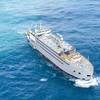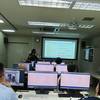The Global MTTC Network (GMN) maritime technology project, run by International Maritime Organization (IMO) and funded by the European Union, was presented during a side-event (10 November) at the UN climate change conference in Bonn, Germany (COP 23).
The project established a network of five regional Maritime Technology Cooperation Centres (MTCCs). Representatives of the European Union, IMO, MTCC-Caribbean and MTCC-Pacific participated at the event.
MTCCs updated the audience on their pilot projects, including data collection on fuel oil consumption on ships. From 2019, ships over 5,000 gross tonnage worldwide – which account for 85% of CO2 emissions from international shipping - will be required to collect consumption data for each type of fuel oil they use, as well as other, additional, specified data including proxies for transport work.
The pilot projects are good examples of how the MTCCS will support implementation of IMO’s energy efficiency regulations. The MTCCs will also work to help participating countries develop national energy-efficiency policies and measures for their maritime sectors and promote uptake of low-carbon technologies and operations in maritime transport. Presentations were followed by a panel discussion.
Also at COP 23, IMO participated alongside the International Civil Aviation Organization (ICAO) in a special event (7 November) on actions and progress made by ICAO and IMO in addressing emissions from international aviation and maritime transport. IMO’s Edmund Hughes highlighted recent progress towards developing a draft initial IMO GHG strategy.
At the UN Oceans Side Event (11 November), IMO’s Jose Matheickal again highlighted IMO’s work to mitigate greenhouse gases from the shipping sector. This side event brought together various agencies from the UN system, to speak about actions that countries are taking, with the support of the UN system, to address climate related multi-stressors on the ocean. Improved scientific capacity to understand ocean change, the development of CO2 mitigation strategies and new innovative adaptation approaches were discussed.
Matheickal also participated in a panel discussion on Sustainable Mobility in a Changing Climate. He noted successful public-private partnerships within the maritime sector, such as the Global Industry Alliance to support low carbon shipping (GIA) and said that new global roadmaps can ensure better synergies among key stakeholders.










